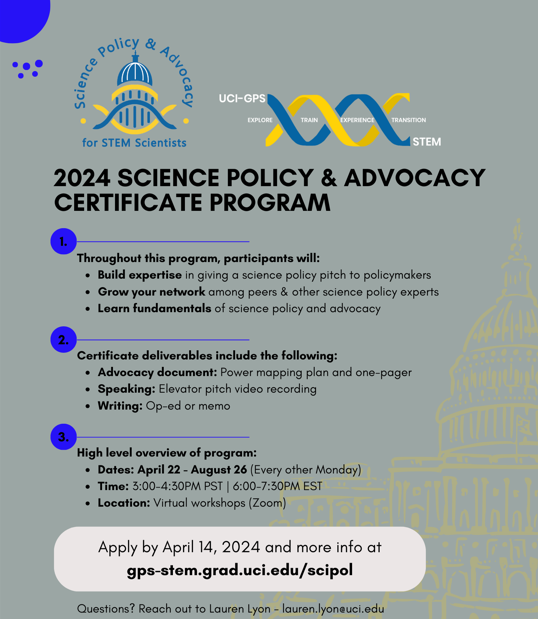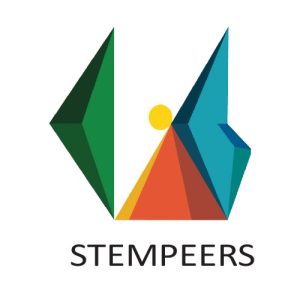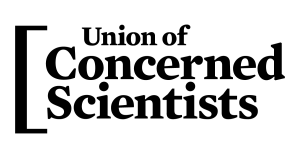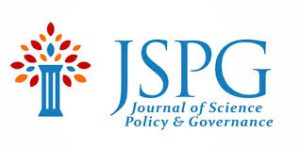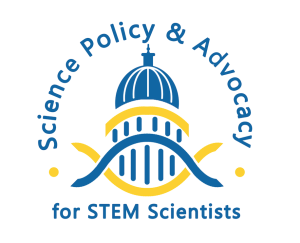
UC Irvine’s Public Policy Prep
2024 Certificate Program
2024’s
Science Policy & Advocacy Certificate Program
2024 Application is now closed.
This virtual program is designed to teach STEM graduate students and postdoctoral trainees the essential skills required for a career in science policy. The program will cover a range of topics including policy development, communication, resources and funding opportunities, networking and career pathways.
Coordinating Team
Lauren Lyon, MA, LPCC, Co-Director of Certificate Program. Program Director of Graduate Professional Success for STEM PhDs and Postdocs at University of California, Irvine
Adriana Bankston, PhD, Co-Director of Certificate Program. Founder & CEO, Bankston Policy Consulting LLC
Karina Brocco French, PhD, Co-Coordinator of Certificate Program. National Science Foundation Graduate Research Fellow in the Department of Ecology and Evolutionary Biology at the University of California, Irvine
Moraima Matus-Nicodemos, PhD, Co-Coordinator of Certificate Program. Director of Student Services- Columbus Technologies.
Anna Andronicos, PhD Candidate, Co-Coordinator of Certificate Program. PhD Candidate in BioChemistry at UC Irvine.
Speakers:
Need more info?
Check out the information session for logistics and examples of what you’ll be learning and skills you’ll develop through this program
About UCI’s Policy Prep Program
The past two decades have seen increased collaborations between scientists and policymakers. As these collaborations increase, so does the need for specialized training that will better prepare STEM grad students and postdocs for science advocacy and careers in public policy. UCI Public Policy Prep (P3), organized and funded by GPS-STEM (Previously, GPS-BIOMED), is designed to meet this need. This program incorporates: public policy seminars, communication workshops, trainee working groups led by local advocacy groups or campus partners, and visits to Sacramento & Washington D.C. Recently, the programming has moved towards building learning modules e.g certificate program (below).
P3 GOALS:
1) Increase knowledge of & experience with public policy processes
2) Increase knowledge of & experience with advocacy related to science policy
3) Develop the ability of trainees to communicate effectively with members in the policy arena
Program Highlights
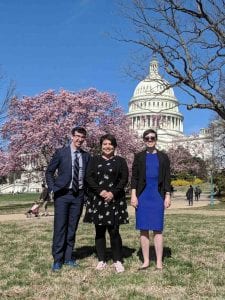
2019 Capitol Hill Visit Day
On March 25, 2019, 3 active members of P3 program visited D.C and campaigned for effective NIH funding and STEM education policies.
Congratulations to Evelyn Valdez-Ward, William Pandori and Maria Montchal for being invited by American Institute of Biological Sciences to participate in discussions with policy makers in D.C.
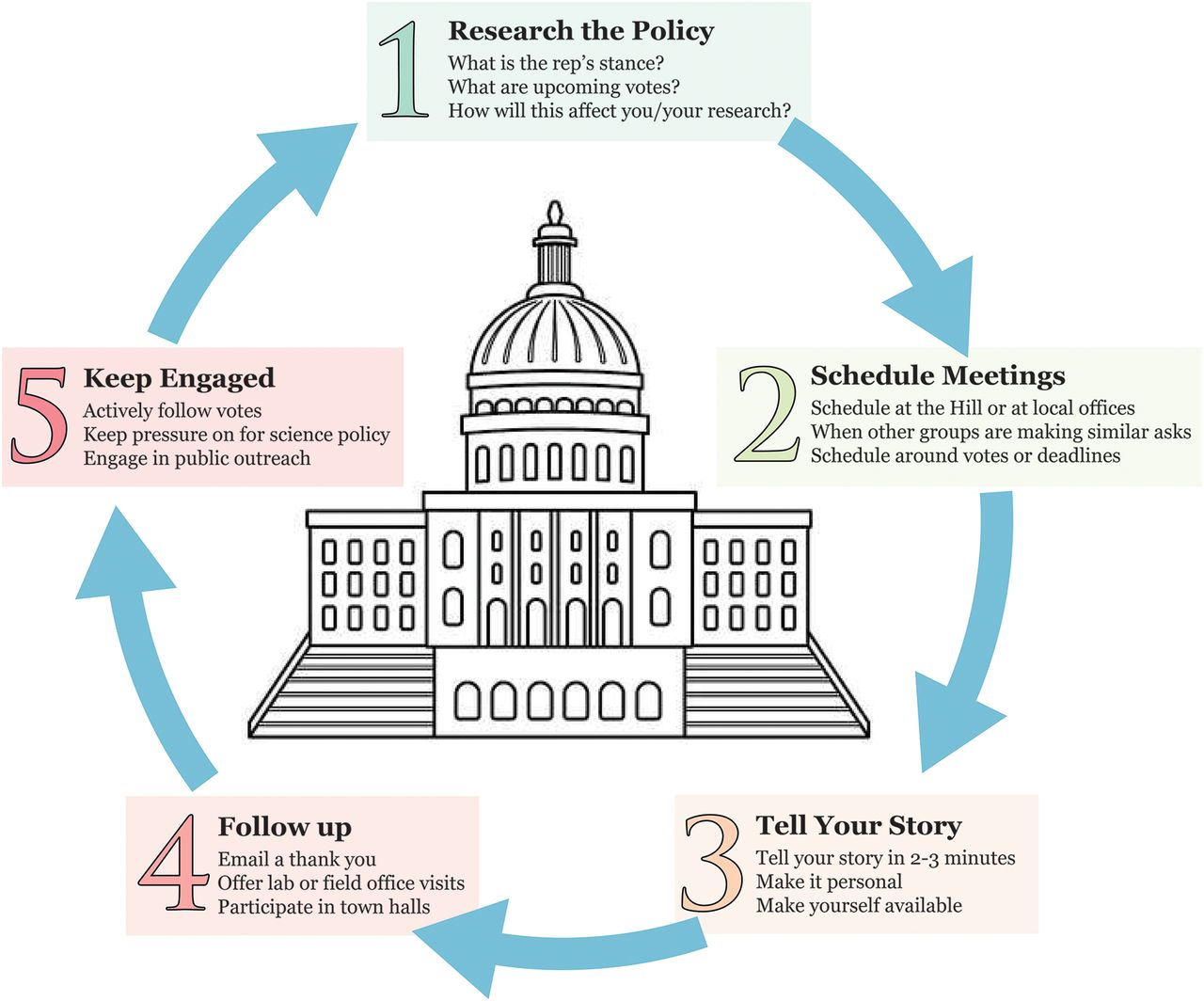
2020 PNAS Publication
P3 program members shared their policy journey via an opinion piece on “Science Policy for Scientists” in Proceedings of the National Academies of Sciences (PNAS)
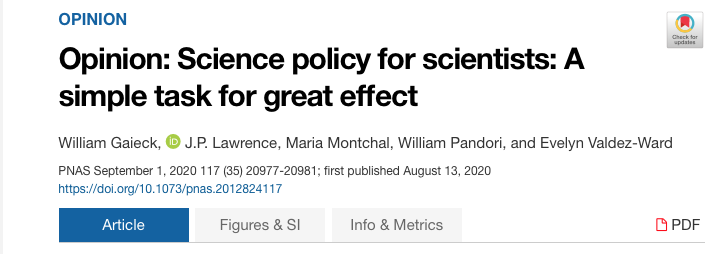
History
After the Burroughs Welcome Fund (BWF) grant, we are offering innovative ways to teach policy to junior researchers. One of the latest initiative is Science Policy Podcast series. The series is possible due sponsorship by BWF and bring students, postdocs involved in policy arena as well as policy professionals from all over the country. In 2020, we designed a mini-course (certificate program) in science policy & advocacy for STEM scientists (details below). This program offers in-depth knowledge, training, & networking opportunities for policy enthusiasts.
Past Programs
2023 Science Policy & Advocacy Certificate Program for STEM Scientists
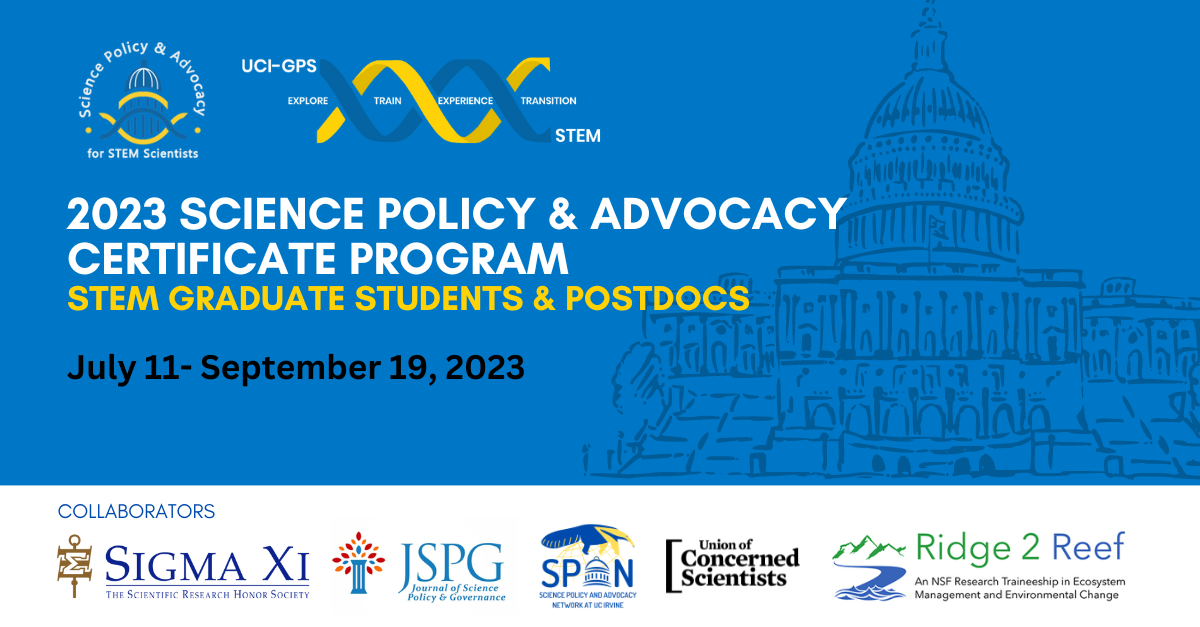
The 2023 course virtual program taught STEM PhDs and postdoctoral trainees the essential skills required for a career in science policy. The program covered a range of topics including policy development, communication, resources and funding opportunities, networking and career pathways.
A look into 2023's Program
Science Policy & Advocacy Certificate Program for STEM Scientists
Please direct your queries to SciPolUCIrvine@gmail.com
Activities
- Listen to GPS-STEM Radio – Science Policy Podcasts to learn about science policy careers
- Construct science policy pitch for policymakers
- Write blog post on improving the research enterprise
- Design advocacy one pager document for policymakers
- Craft a power mapping plan on your topic of interest for policymakers
Outcomes
- Build expertise in giving a science policy pitch to policymakers
- Grow your network among peers and other science policy experts
- Perform informational interviews (GPS-STEM Radio-Science Policy Podcast) with science policy professional
- Learn fundamentals of science policy and advocacy from various resources
Course Organizers:
Joanne Ly, PhD, Program Director, Graduate Professional Success in STEM at UC Irvine
Adriana Bankston, PhD, Chief Outreach Officer, Journal of Science Policy and Governance (JSPG)
Melissa Varga , Community Manager and Partnership Coordinator, Union of Concerned Scientists (UCS)
2021 Science Policy & Advocacy Certificate Program for STEM Scientists

The 2021 course is being offered in “flipped-classroom learning” format, where participants will watch 2020 course recordings and attend classes for Peer-assisted Learning. We will still have a mix of lectures, panel discussions with experts, peer-peer learning opportunities, power mapping plans & policy pitch building followed by policy elevator pitch competition.
Detailed inside look into 2021's Program
Science Policy & Advocacy Certificate Program for STEM Scientists
Thursdays at 3PM – 4PM(PST)
Start date July 15, 2021 (10 modules)
Please direct your queries to SciPolUCIrvine@gmail.com
As the world is struggling to navigate the COVID19 pandemic and trying to find the best ways to contain the viral spread by developing therapies and vaccines, scientific research funding discussions are at the forefront. For the past several years, a large part of the federal budget has been allocated towards defense & war preparedness. As a result, science-related policies and associated funding used to tackle disease outbreaks, climate change, healthcare and education issues, has suffered significantly.
Scientists must play a significant role in the post-COVID19 recovery process by educating policymakers and the public on the importance of evidence-based research, in order to ensure the development of comprehensive, effective and long-lasting policies. This can be encouraged by providing STEM scientists (PhD students and postdocs) with a better understanding of science policy and advocacy through specialized training.
For the past two decades, we have seen increased collaborations between scientists and policymakers, however, recently, that trend is under progressive decline. As we plan to recover from the pandemic, we also need to develop effective and ethical policies to prepare ourselves in tackling its ripple effects, including a post-pandemic mental health crisis, a ramped up industrial production-induced climate change, a crippled and weak healthcare system, and a wounded educational system.
To accomplish this, University of California, Irvine’s Public Policy Prep (P3) program is thrilled to unveil an online course in science policy and advocacy for STEM scientists (PhD students & postdocs) with a focus on learning basic skills and concepts, as well as identifying concrete ways to transition into careers in these areas. To showcase the value of science communication for STEM scientists in promoting effective policy change, this course is organized in conjunction with The Journal of Science Policy and Governance (JSPG) and UCI’s Ridge to Reef program. Similarly, the Union of Concerned Scientists (UCS) will provide strategies for effective communication by which STEM scientists can engage in public policy and advocacy. Overall, the course will incorporate lectures on various topics in science policy and advocacy, workshops for developing communication skills, and peer-to-peer learning opportunities to sharpen skills in these fields.
Activities
- Listen to GPS-STEM Radio – Science Policy Podcasts to learn about science policy careers
- Construct science policy pitch for policymakers
- Write blog post on improving the research enterprise
- Design advocacy one pager document for policymakers
- Craft a power mapping plan on your topic of interest for policymakers
Outcomes
- Build expertise in giving a science policy pitch to policymakers
- Grow your network among peers and other science policy experts
- Perform informational interviews (GPS-STEM Radio-Science Policy Podcast) with science policy professional
- Learn fundamentals of science policy and advocacy from various resources
Register here for July 15 2021 offering of the course.
Certificate in Science Policy
- Participate in competition for best policy pitch, written policy piece, blog post awards
- Gain certificate in policy and advocacy (upon course completion & participation in activities)
- Winners will have a chance to interview science policy professionals on Science Policy podcast of GPS-STEM Radio
Syllabus & Schedule : Science Policy & Advocacy for STEM Scientists
Resources on Science Policy & Advocacy for Early Career Researchers (ECRs)
—————————————————————————————————————-
Course Coordinators: Please direct your queries to coordinators via SciPolUCIrvine@gmail.com
Ria Deshpande, GPS-STEM Council Member, UCI
Klebea Carvalho, GPS-STEM Council Member, UCI
Melania Abrahamian, PhD., Postdoctoral Scholar, UCLA
Course Organizers:
Harinder Singh, PhD, Program Director, Graduate Professional Success in STEM at UC Irvine
Adriana Bankston, PhD, Chief Outreach Officer, Journal of Science Policy and Governance (JSPG)
Melissa Varga , Community Manager and Partnership Coordinator, Union of Concerned Scientists (UCS)
Acknowledgements
We would like to thank the speakers and moderators, as well as our valuable partners, for agreeing to help train the next generation of science policy leaders by being part of this certificate program. We would also like to thank Melinda Gormley, Mark Bayer, Christopher Pickett, Shalin Jyotishi, Donovan Guttieres and Bernat Navarro Serer for their feedback on the course, as well as others who helped with suggesting or recruiting speakers, providing comments on the contents, and assisting with resource development. Additionally, thanks to JSPG’s Director of Communications, Saheel Mehta, and GPS-STEM multimedia director, Joanne Ly for the beautiful graphics.
Course Collaborators:
Graduate Professional Success in Science, Technology, Engineering, & Math (GPS-STEM) program of University of California, Irvine, prepares PhD students and postdocs for a variety of careers within the S.T.E.M research workforce, and empowers them to become not only skilled researchers but also polished professionals. The program works to create, identify and support innovative approaches to broaden graduate and postdoctoral training in STEM. Visit https://sites.uci.edu/gpsbio and follow @BiomedGps on Twitter to learn more.
The Journal of Science Policy & Governance (JSPG) is a nonprofit organization and open-access, peer-reviewed publication managed by and for students, policy fellows, and early career researchers in science, technology, and innovation policy. Since 2011, JSPG has provided students and early career researchers a vehicle to bolster their research and writing credentials in science policy. Visit sciencepolicyjournal.org and follow @SciPolJournal on Twitter to learn more.
Ridge to Reef (R2R) is a NSF supported Research & Traineeship in Urban Ecosystem Management program, which trains scholars with the skills to manage valuable natural resources in and around urban complexes. Graduate students are trained in the process of convergent science whereby engineers, scientists, and practitioners co-develop research priorities to solve common platforms. R2R trainees are equipped with the skills to inform or become practitioners who implement management solutions. Visit r2r.bio.uci.edu and follow @Ridge2Reef
Union of Concerned Scientists (UCS) is a national nonprofit organization founded more than 50 years ago by scientists and students at the Massachusetts Institute of Technology. UCS’s mission is to use rigorous, independent science to solve our planet’s most pressing problems. Joining with people across the country, we combine technical analysis and effective advocacy to create innovative, practical solutions for a healthy, safe, and sustainable future. Visit https://www.ucsusa.org and follow @UCSUSA on Twitter to learn more.
Thank you to our 2021 sponsors:
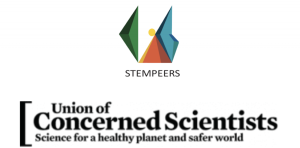
2020 Public Policy Prep (P3) Certificate Program
In 2020, GPS-STEM’s Public Policy Prep (P3) Program collaborated with the Ridge to Reef at UCI, the Journal of Science Policy & Governance and the Union of Concerned Scientists (UCS) to offer a Certificate Program in science policy & advocacy for early career researchers (PhD students & Postdocs).
The course was a mix of lectures, panel discussions with experts, peer-peer learning opportunities, power mapping plans & policy pitch building.
Detailed inside look into 2020's Program
The course modules included –
1. Introduction to science policy & advocacy
2. Types of policy (Neuroscience, Cancer, STEM education, workforce development, environmental research)
3. Effective advocacy strategies for policymakers
4. Transitioning into policy careers
5. Effective communication for public policy & advocacy
6. Leveraging science policy training for industry careers
7. Ways to get involved at your local level
2019 Science Policy Symposium
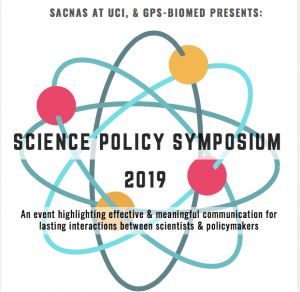
Detailed inside look into 2019 Science Policy Symposium
P3 Program of GPS-BIOMED collaborated with SACNAS UCI Chapter to organize OC’s biggest Science Policy Symposium highlighting effective and meaningful communication for lasting interactions between scientists & policy makers. The mail goal of the event was to engage policy makers in a dialogue with scientists in understanding their needs and allow for exchange of information.
Keynote Speaker: Farrah N. Khan, Council Member, City of Irvine.
Panel discussion with basic scientists who ran for office : “I Ran for Office, Here’s what I learned“
Panel Discussions : Health Policy & Environmental Policy
2016 – 2018 Program APPROACH
We designed a three-tiered program, which fused learning and practice. Trainees chose their degree of participation within the following tiers.
Tier 1 (Fall 2017): Trainees gained foundational knowledge and skills by attending a series of seminars and workshops.
Tier 2 (W, Sp, Su 2018): Trainees applied newly gained information and skills by examining specific issues in small working groups. The groups were mentored by our community & campus partners including: Alzheimer’s OC, Cancer Action Network, RAND corporation, UCI MIND, UCI CNLM, UCI Environmental Health Sciences and UCI Community & Government Relations.
Tier 3 (Spring 2018): Select trainees who showed outstanding dedication and teamwork met with legislators, staffers and policymakers at the local, state and federal level.
P3 program members shared their policy journey via an opinion piece on “Science Policy for Scientists” in Proceedings of the National Academies of Sciences (PNAS)
Detailed inside look into 2016-2018's Program
Tier 1: Building a Foundation (Fall & Winter 2017)
Monday, September 25th: Program Overview & Alzheimer’s OC Call to Action (12-1PM, NS2-1201, lunch provided)
- Summary Materials: UCI P3_Program Overview_with notes
- Alzheimer’s Orange County policy project summary: AD-OC_leg info_pg 1; AD-OC_leg info_pg.2
Monday, October 2nd: Introduction to Science Policy & Advocacy (12-1PM, NS2-4201, lunch provided)
- Summary Materials: The policy cycle_pg.1; The policy cycle_pg.2
Monday, October 9th: Know Your Audience: Understanding the Politician (12-1PM, NS2-4201, lunch provided)
- Summary Materials: Know Your Audience Politician_P3_Slides&Notes_Gormley
- Supporting Materials: DoingSciPolicy_Gormley
**Friday, November 3rd: How Science Policy is Crafted & Career Opportunities for Scientists (12-1:30PM, NS2-4201, lunch provided) **All attendees can network with speakers at a coffee chat (2-3:30PM) & happy hour (5:30PM) following the seminar
- Summary Materials: Science Policy Careers
- Supporting Materials: CCST Science Fellows Brochure
Monday, November 6th: Effective Writing for Public Policy (12-1PM, NS2-4201, lunch provided)
- Summary Materials: Effective Writing for Policy_with notes
**Thursday, November 9th: U.S. Science Policy: Advocating for Science in an Era of Polarized Politics and Constrained Budgets (12-1:30PM, CALIT2 Auditorium, lunch provided) **All attendees can network with Toby at a coffee chat (2-3:30PM) & happy hour (5:30PM) following the seminar.
- Summary Materials: US Sci Pol_Toby Smith
Monday, November 20th: The Impact of Science & Technology in Advocacy (12-1PM, NS1-1114, lunch provided)
- Summary Materials: UCI November Outreach_2017
Friday, March 23rd: History of the FDA & Opportunities for Trainees (12-1PM, NS2-4201, lunch provided)
- Summary Materials: Life Beyond the PhD at the FDA
- Summary Materials: FDA History_Past, Present and Future
Tier 2: Experiential Learning Through Teamwork (Winter, Spring, Summer 2018)
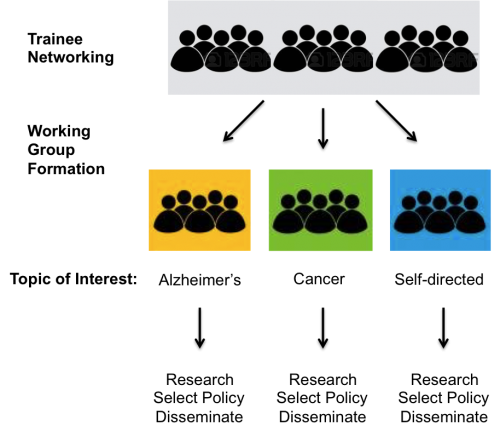
Within Tier 2 trainees will engage in working groups focused on self-identified interests or activities of our advocacy partners, which include: Alzheimer’s OC, Cancer Action Network, RAND Corporation, UCI MIND, UCI CNLM, UCI Environmental Health Sciences and UCI Community & Government Relations. Prior to the formation of the working groups, trainees will participate in a networking event to facilitate the organic assembly of these groups. Once formed, groups must identify specific policy issues, devise talking points and decide on dissemination methods. These methods may include speaking with appropriate stakeholders, writing op-eds, and responding to Dear Colleague letters. A campus mentor or community partner will be assigned to each group to aid during this process.
A detailed schedule of Tier 2 can be found here: UCI P3_Capstone Project Meetings_CORRECT DATES
Tier 3: Science Policy & Advocacy in Action (Spring 2018)
In partnership with UCI Community and Government Relations, select trainees will have the chance to meet with legislators, staffers or other policymakers who are directly linked to policy issues explored during working group research projects. These visits can occur locally, at the state capitol or in Washington D.C. Trainees who are selected will be highly engaged participants who show outstanding dedication, leadership and teamwork throughout their time in P3. **P3 will conclude with a networking & outreach forum bringing together trainees, UCI faculty members, community members and local policymakers. At this event, working groups will be encouraged to present brief overviews of the projects they worked on.**
UCI P3 was created by GPS-BIOMED & is funded by the Burroughs Wellcome Fund.

